17.5K
Downloads
67
Episodes
Dr. Nisha Chellam is a Board certified Internist who is also board certified in Integrative and Holistic medicine. She believes that diminished health and vitality can be reclaimed by just about any proactive person at any age. Dr. Chellam practices functional medicine in Novi, Michigan where she incorporates Nutrition, Fitness, hormone balance, and permanent weight control. Every week, Dr. Nisha gives you tips on how to take control of your health because YOU are your best doctor.
Dr. Nisha Chellam is a Board certified Internist who is also board certified in Integrative and Holistic medicine. She believes that diminished health and vitality can be reclaimed by just about any proactive person at any age. Dr. Chellam practices functional medicine in Novi, Michigan where she incorporates Nutrition, Fitness, hormone balance, and permanent weight control. Every week, Dr. Nisha gives you tips on how to take control of your health because YOU are your best doctor.
Episodes
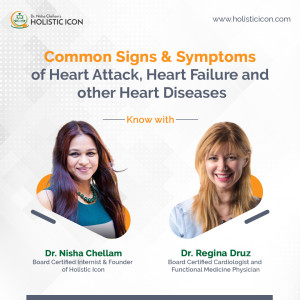
Monday Feb 08, 2021
Misperceptions In Cardiology
Monday Feb 08, 2021
Monday Feb 08, 2021
Misperceptions in Cardiology
As common as cardiovascular issues are, unfortunately, so are the misconceptions people have surrounding cardiovascular diseases & cardiology.
In this blog, Dr. Nisha Chellam, Founder and Internist at Holistic ICON conversation with Dr. Regina Druz, Board Certified Cardiologist and Functional Medicine Physician, FACC and FASNC, clears up all the misperceptions pertaining to cardiology, such as:
- Preventive Cardiology vs. Cardiac Surgery
- Cardiovascular Diseases
- Traditional Cardiology vs. Functional Medical Approach
- Risk Factor: Hypertension
- Risk Factor: High cholesterol
- A Heart-friendly Diet—Do’s & Don’ts
All the answers from a functional medicine perspective. So, lie back & keep reading.
Preventive Cardiology vs. Cardiac Surgery
When talking about cardiovascular diseases, the first image that comes to one’s mind is of a person clutching their chest during a heart attack, followed by taking the person to a cardiac surgeon for a stenting procedure.
While this is a common notion, it’s certainly not true. Procedural cardiology (such as surgery or stenting) is the end-stage management of cardiovascular diseases; just the tip of the iceberg. This notion has given the preventive aspect of cardiology a low priority.
On the other hand, preventive cardiology is the study & analysis, followed by the treatment of chronic heart diseases; to effectively prevent or fix them. Most of the curing of heart diseases isn’t always as dramatic as putting in a stent or a defibrillator.
Dr. Druz explains this through an exceptional analogy of forest fires; where heart diseases are uncontrollable fire in someone’s vascular system.
“Through the normalization of these acute treatments like surgeries & stenting, what we’re doing here is putting out the fires, but not preventing the forest from getting dry.”
— Dr. Regina Druz, Board Certified Cardiologist and Functional Medicine Physician
So, how do we prevent these diseases from a global standpoint?
- We need to stop adding fuel: By paying attention to apparent risk factors such as hypertension, diabetes, high cholesterol, or obesity, and not normalizing them.
- We need to take care of the forest so that it doesn’t become too dry and susceptible to catching fire by taking care of the foundations of health—eating the right food, managing stress, etc.
Cardiovascular Diseases
All the heart conditions concerning damaged or diseased parts of the human heart are called cardiovascular diseases, as simple as that. However, people still fail to realize that there are multiple other forms of heart disease other than heart attacks, cardiac arrest, or coronary artery disease (CAD).
- Structural diseases
- Heart failure
- Blood Clots
- Deterioration in the function of the heart muscle
- Diastolic dysfunction
- Arrhythmia
- Vascular diseases
This understanding will help clear the misconception that all of the cardiology is concerned with just bypass surgeries & stent placements.
Traditional Cardiology vs. Functional Medical Approach
When a person goes to a traditional doctor, they will put the person on medications related to what their situation is. Then, the doctor might send them back after stenting that one dangerous vessel & ask them to follow up for elective stenting.
Unlike the traditional approach to cardiovascular assessment, functional medical cardiologists go to the root cause of the problem. The functional medical perspective asks more “why” questions to reveal the history behind the risk factors, depending from patient to patient. They delve deep into the root cause of hypertension, or obesity, or stress, or high cholesterol, etc. Practitioners assess the impact of the environment, genetics, diet & even pollution on the person's condition.
Thus, functional medicine provides the foundation that traditional cardiology doesn’t.
Risk Factor #1— Hypertension
Most people tend to exaggerate the numerical measurements when it comes to high blood pressure.
The functional medical cardiologists approach such situations by helping the patient realize that the blood pressure measurement is more than just a separate measurement at a specific time; there’s so much more to it. Such involvement in the whole journey helps them understand the gravity of their reactions to numbers and even calms them down.
Root Causes
Before looking for the root causes, the doctor considers the context & the timeline of the condition and cross-checks any secondary causes. After this, the doctor confirms if the patient is hypertensive or not.
Whether the patient has labile blood pressure or established hypertension, there are two causes:
- Insulin resistance: Insulin resistance is one of the most overlooked causes of hypertension, ignoring which you may/may not increase your chances of gradually developing type 2 diabetes.
- Sympathetic Activation: While most people are not aware of their sympathetic reactions, being in this state of fight or flight causes consistent changes in the vascular tone, changing the vessels without the person even realizing it. Being in this zone of an increased heart rate contributes to hypertension.
Risk Factor #2—High cholesterol
Cholesterol alleviation is a stress reaction or an indicator of imbalance. In functional medicine, cardiologists strive to find the reason behind the high cholesterol levels instead of just prescribing cholesterol decreasing medications.
Misperceptions:
- No need for statin drugs if there’s an optimal level of cholesterol.
Wrong. The patient still needs to be put on statin drugs for LDL because of the residual risks of cardiovascular problems. - Having high levels of HDL or the “good” cholesterol protects you from cardiovascular diseases. Not always. At times people have HDL cholesterol levels that are just too good to be true. In such cases, patients should check:
- the amount of LDL & HDL particles
- the size of LDL & HDL particles
Having extremely high levels of HDL can be a sign of zygosity that can cause dementia.
Medication—Statin Drug
Statin, a cholesterol-lowering drug, increases the coronary arterial calcification causing the more unstable plaques to come to their final healing stage and get calcified, which is a good thing. The likelihood of memory-related issues only increases when the cholesterol level goes to less than 150.
The decision to take Statin drug depends on:
- Total cholesterol production
- Cardiac risk
- Cognitive risk
- Genetic risk (direct or polygenic)
- Lipoprotein (a) levels
A Heart-friendly Diet
Cardiologist-recommended diet for a healthy heart has clean eating, hydration, timely eating & elimination of sugars as the foundation.
Do’s
- Follow the Mediterranean-style diet
- Incorporate healthy fats
- Avoid processed foods
- Cut off all saturated & trans fats
- Follow time-restricted eating patterns
Don’ts
- Consumption of simple sugars
- Opt for a Ketogenic diet as a long-term solution
- Over-consumption of fish oils (Omega 3 & Omega 6)
Supplements
- Optifibre, by Xymogen
- Alpha Lipoic Acid (ALA) (for patients with insulin resistance)
- BergaCor Plus, by Xymogen
- Metamucil
This blog covered just the highlights from our latest podcast by Dr. Nisha Chellam, Board Certified Internist and Founder of Holistic ICON, and Dr. Regina Druz, Board Certified Cardiologist, Functional Medicine Physician, FACC, and FASNC. If you wish to listen to a more detailed version, you can listen to the entire podcast on our YouTube channel by clicking this link:
In case you have any questions related to cardiology or cardiovascular diseases, please drop us an email with your question and a brief about yourself at xxx or xxx, and we will get back to you shortly.
Hoping this blog was helpful!
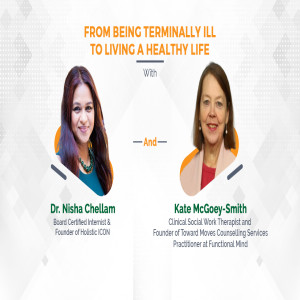
Monday Feb 01, 2021
5 Steps to track your recovery
Monday Feb 01, 2021
Monday Feb 01, 2021
5 Factors To Fast Track Your Treatment Recovery
We've all heard of some of the miraculous patient recovery stories at one point or another. Cases where patients who were in the last stage of their disease process have not only reversed their disease but in many cases overcome it completely. In fact, after their getting over the disease, they continued to maintain and live a healthy and fulfilling life. Based on research, there were certain similarities found in the patients’ attitudes and their actions that are suggested to have supported their recovery journey. Here are the top 5 qualities that were analyzed to be the most common among those who experienced a transformative treatment and recovery journey:
- Being vigilant and aware
The sooner you catch your disease or condition, the higher are the chances for it's complete and speedy recovery. One way to do this is by taking note of any abnormalities you observe in your body's functioning and taking an action right away. For instance, if you're continuously experiencing tiredness and fatigue that too just by half-day then perhaps you should get it examined by your doctor. Another part of it is keeping yourself aware via credible resources so that you understand what's going on within your body and can ask the right questions to your care providers.
- Accountability
Perhaps, this is the most important factor to determine a speedy recovery. It's because by taking the responsibility of your treatment, you're actually coming on the driver's seat and are committed to doing everything that will help your heal better and faster. Even if it means making some uncomfortable lifestyle changes or anything else. Unlike how patients mostly become dependent on their care providers for their treatment and become obliged to everything they say or act, a patient who has taken accountability for her treatment won't give in until she feels satisfied with her treatment. She will continue asking the right questions and look for options until she finds one that works for her because she has taken control of her body and recovery in her own hands.
- Nutrition
Needless to say, nutrition is a big differentiator. In fact, it's a key factor that contributes to your disease condition happening in the first place. What we choose to put into our bodies indefinitely creates an impact on our health, it's a fact known by all. So it's very important to be mindful about it and make healthy dietary choices.
- Lifestyle
After food and nutrition, living a healthy lifestyle is the second most important factor that impacts the health and wellbeing of a person. Also, plays a crucial role in his/her recovery from any disease. It includes everything right from your workout to your socializing activities or the absence of them. Basically how and where do you choose to spend your time and is it in congruence with what's best for your body or not.
- Environment
Last but not the least, environment in which you live and breath inevitably impacts your health and wellbeing as well as your recovery journey. So many conditions surface due to someone's unhealthy environment. So many times a disease is majorly found in people in a certain working environment/ region. For example, Asbestos exposure is the number one cause of work-related deaths in the world. This alone shows how important is the external environment is for your health and it is just one example of it. There are so many such examples that will validate this fact.
If you or your loved one is in their recovery journey right now and you are reading this blog, it itself is a proof that you are taking the responsibility of healing well and faster, and doing everything in your hand to get there. Just a last piece of advice, as you continue to make yourself aware and adapt practices that will facilitate your recovery, be patient and give yourself sometime for the positive impacts of your actions to be visible. Because while decline to reach a certain stage in your disease process might be a swift journey however, reversing it and building a sustainable health takes time like anything worth having in life. Because in the end, health is precious and priceless.
Hope you found this blog helpful and in case you have any questions, please send them to us at drchellam@holisticicon.com or marinas17@holisticicon.com and we will get back to you shortly.
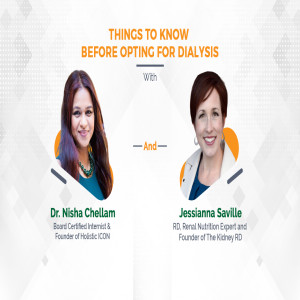
Thursday Jan 21, 2021
What if Dialysis can be avoided? Would you?
Thursday Jan 21, 2021
Thursday Jan 21, 2021
Things to Know Before Opting for Dialysis
And the role of nutrition in treating kidney disease
Kidney disease is the first socialized medical condition. As such, in the traditional medical system, it's sometimes observed that patients whose treatment is possible via approaches other than dialysis are also put on dialysis. To anyone who knows a little about dialysis and its process would agree it's not an easy process and almost like a part-time job that you don't get paid for. In our latest podcast with Jessianna Saville, RD, Renal Nutrition Expert and Founder of The Kidney RD, she says that:
“If patients knew they had an option other than dialysis, they wouldn’t sit in that chair.”
This and other sensitive issues related to the treatment of kidney disease (/ n-stage renal disease) were also be discussed in the podcast. Here are some highlights:
Two Key Aspects of Kidney Treatment
- Preserving kidney function
- Preventing any complications
Who is at risk of kidney disease?
Some of the symptoms that indicate an issue with kidney function include:
- High BP
- Diabetes
- Deficient (depression)
- IBUProfen
- Age (over 65 years)
People who experience one or more of the above symptoms should go for an annual kidney check-up, be aware of their test results and reach the specialist as they observe any discrepancies.
"The more functional your kidneys are, the less restrictive the dietary approach becomes."
Is it possible that ppl have kidney disease without any high blood pressure or high cholesterol and regardless of age?
Yes, below are some factors that may contribute to a kidney disease irrespective of BP, HC, or age related factors:
- High protein diet
- Lifestyle
- Kidney gut access (IBS, Skin rashes, Joint problem)
A point to note is that all of the above are related to gut. This means your gut health plays a major role in your kidneys’ efficient functioning.
“The body can heal itself if you get in the right condition and getting in the right condition is like getting into the right diet.”
“Nutrition hands down is so powerful in preserving kidney functions.”
The Traditional Medicine Approach
when it comes to kidney function:
“I’m watching you fail and when you fail 4 years from now, I’ve the solution to keep you alive.”
Message of Moderation
It's a diluted form of advice or recommendations given to people looking for help to improve their kidney function. It most likely leads to moderate results and at worst no results at all. This is because, a message of moderation:
- May have a place in a diet crazed world, hyperfocused on the latest and greatest, bio-hack, etc.
- Have no place in case of serious/ chronic kidney disease. For people who don’t want to end up on dialysis and have a long healthy life
"Message of Moderation has no place in case of serious/ chronic kidney diseases."
Plant-Based Approach for Treating Kidney Disease
- No moderation: Fewer meat meals to 100% plant-based diet
“Go plant-based cause stakes are high.”
- Start with the most aggressive/ restrictive approach and liberalize as you know the person well
“Diet is not hard, dialysis is hard.”
Signs of Improved Kidney Function
- Kidney function resilience
- Pro-health
- Its impact on the rest of the body
“The power to shift your health is how you nourish yourself. It is that simple.”
Two Major Areas of Focus
What needs to shift?
- Ignorance of doctors/ lack of focus: Most of them focus on are treating sickness by managing symptoms and not on getting well
- The current insurance system
Signs of an Aware Patient
And what can you do to be one?
- Proactively ask relevant questions
- Expect answers
- Change the doctor if you don’t get an answer
- Focus on your own lifestyle
- Get your lab reports checked
3 Questions People Should Ask About Their Medication
- What is its side effect?
- How long will I be on this?
- Is there any way I can get off this?
Summary
- The kidney is often ignored until it’s a crisis
- Ask your physician if your kidney is OK, especially if you’re in a high-risk condition
- Find the right kind of dietician
- Be cautious and alert, act on the right time
To know more, check out our latest video:
https://www.youtube.com/watch?v=fWFARQr3UYQ
In case you have any questions, please send them to us at drchellam@holisticicon.com or marinas17@holisticicon.com and we will get back to you shortly.
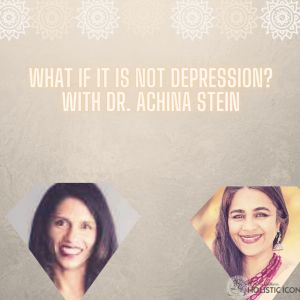
Friday Jan 01, 2021
What if it is not depression? With Dr. Achina Stien
Friday Jan 01, 2021
Friday Jan 01, 2021
2020 has been a trying year for all . We begin 2021 with great intentions and a vision for a bright future to al.
Here is my conversation with Dr. Achina Stein a psychiatrist who helps us understand when mood disorders can actually be resolved.
5 Things to Know Before You Visit a Psychiatrist
Are you someone who is frequently experiencing severe mood fluctuations, anxiety, depression, panic attacks, lack of concentration, or other mental health-related symptoms? Perhaps your condition has become painfully unbearable and you are now planning to visit a psychiatrist for help? Well, then this blog is for you. This blog will introduce you to a fascinating approach to look at, understand, and go about finding a resolution to your issue. Not only will it empower you to be in better control of your condition by making a radical shift in outlook toward your health and wellbeing but also potentially introduce you to an elevated and fulfilling life that you never thought existed. So make sure you give this blog a good read before going to your next (or first) appointment with your psychiatrist.
The ‘What do I have?’ Phenomenon
Often if someone undergoes a feeling of depression and feeling low on a frequent basis, they or at times tend to start labeling it as depression or start to immediately start working towards identifying what’s wrong with them and the question they wrap their heads around becomes ‘what do I have?’
What’s wrong with it?
They can’t be blamed for it, after all, we are painfully human when we are trying to figure out the issue so that we can fix it. The problem is that if you only allow yourself to look at your issue from the conventional lens of traditional medicine, then you might never find out the actual cause of your symptoms. All that you will be aware of in your treatment process is the diagnosis that your visiting psychiatrist made based on your system and the medication to manage your symptoms. But is that enough?
Instead, Try The Why and the How Approach
Do you truly believe that managing your condition or symptom is the answer to your mental health issue with understanding the root cause? The problem with the former approach besides the expected side-effects is that there is always a risk of the symptoms to return at the slightest of trigger or if the treatment/ medication is stopped. Why? Because no one actually did the digging to reach, treat, and resolve the root cause. This is also why you should drop the what and instead try the ‘why’ and the ‘how’ approach.
And it’s where functional medicine as a practice comes into the picture. As you work with a functional medicine practitioner alongside your psychiatrist, you peel off your symptoms one layer after another until you arrive at what triggered your condition. Interestingly, you don’t just remain on the receiving end as in the case of the traditional approach but become an active participant in your treatment process along with your functional medicine practitioner. It empowering and almost immediately brings to the driver’s seat and take control of your health.
Everything starts with the gut
As a matter of fact, did you know that nearly 90 percent of the body's serotonin, also known as the Happy Chemical, is made in the gut? Let alone mental health concerns, you take diabetes, most heart conditions, thyroid issues, fatigue, and almost all auto-immune or chronic disease, the source of all them comes down to gut health.
Perhaps, what if it’s not depression?
So, it’s very much likely that your feeling low could have an underlying connection with your gut health and it got trigger by your biological, social, and/ or psychological situation. Perhaps, what you are experiencing is not depression and can be totally resolved provided the right thoughts and lifestyle shift. And the first steps always starters with paying attention to your gut health and noticing if there are any abnormalities there.
Patient Story
14-year-old John*, who was an otherwise charming teenager had off-late started to experience extreme difficulty in reading. Matters suddenly got worse when one day John attempted suicide standing on the edge of the 5th-floor of the building he lived in. It came as a complete shock to his family as they could never gauge-in any symptoms that would indicate that John was facing any challenge that was so severe that it got him to think about committing suicide. John’s mother, who was a psychiatrist herself, in an effort to find out the root cause started navigating for the treatment options. It was then that she came across a well-known functional medicine doctor. It was with his intervention that it was identified that John who had always struggled with constipation and eczema, had inflammation in his body. The onset of puberty, with all the drastic changes happening in the body, triggered his gut issues which severely impacted his mental health along with other symptoms like impacting his vision. John worked with his doctor to learn what he needed to do to get back on track and started practicing it. Subsequently, his gut issues were resolved, he got rid of the mental health issue he was facing and started living a healthy and normal life.
Hope you found this blog helpful and in case you have any questions, please send them to us at drchellam@holisticicon.com or marinas17@holisticicon.com and we will get back to you shortly.
*Name of the patient is changed for privacy reasons.
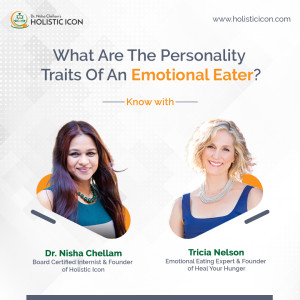
Sunday Dec 06, 2020
Emotional Eating- Understanding the Emotion
Sunday Dec 06, 2020
Sunday Dec 06, 2020
Are you someone who's constantly trying to get control over your frequent overeating but always end up right where you started? Then this post is for you. The PEP Test, as coined by Emotional Eating Expert, Tricia Nelson, helps to identify the plausible reason(s) behind it. To learn more about it and on how to overcome emotional eating, watch our latest podcast: https://youtu.be/EewxjEoGdoM
What is Emotional Eating?
Are you someone who chooses to turn to food if you face stress and anxiety? Does stress eating make you feel better? Do you want to quit emotional eating? If the answer to all of those questions is yes, then this blog is for you.
In this blog Dr. Nisha Chellam, Founder and Internist at Holistic ICON in conversation with Tricia Nelson, Emotional Eating Expert and Founder of Heal Your Hunger, delves deep into exploring answers for frequent questions about Emotional Eating such as:
- What is Emotional Eating?
- What makes some people become emotional eaters?
- What are the root causes that trigger emotional eating?
- Who is more susceptible to emotional eating?
- How can you control emotional eating?
So without any further adieu, let's get started!
What is Emotional Eating?
Emotional eating is when food becomes a frequent go-to resort for someone when they face any kind of stress, anxiety, or high-pressure situation. It's particularly unhealthy if the person becomes so obsessed about eating when in stress that it almost becomes an obsessive-compulsive disorder.
What starts off an Emotional Eating?
A person's inability to channel their stress emotions is the root cause of emotional eating. There can be a lot of reasons for someone to get started with emotional eating but the most common factor that's seen in most of the emotional eaters is that they've undergone a trauma of some kind. For example, it could be a mental illness, sexual abuse, alcoholism, physical abuse, or some kind of addiction in your family that could have squeezed someone towards addiction and since food is most easily accessible so they generally go back to it as a coping mechanism to get their fix. It almost becomes like a vicious cycle where the person gets an emotional trigger, they go in distress and turn to eating as their coping mechanism, then feel a sense of guilt or shame for feeling this way and this cycle goes on.
What are certain personality traits that make an emotional eater personality?
Two traits that are commonly found in most of the emotional eaters are:
- Emotional eaters are people's pleasers and resentful
- They are caretakers and supportive people
Most emotional eaters didn't have a strong sense of self while growing up, could be because of their family dysfunction or due to some other trauma and they don't know who they are, where they stop, and where the other person begins. They start looking for validation from outside and seek a sense of worth from outside of themselves.
And often when they don't get the level of response for which they put all the efforts or did all the work but somehow it didn't get the expected response or praise or validation, they become resentful about it and they say "ok, they didn't see my effort, but I see it and I deserve it" and reward themselves by starting to eat incessantly, as a mechanism to give themselves the compensation for the praise they never got.
How can anyone recognize that they have the problem of emotional eating?
To some extent we are all emotional eaters, we are all on the spectrum. The problem happens when someone gets on the extreme end of the spectrum. Simply put, the less you have control over yourself when it comes to emotional eating, the greater will be the impact and the more control you have on yourself the less will be the impact of emotional eating.
What tools can anyone use to recognize or be aware of it, to get some degree of control?
For anyone who believes that they're overeating or have a problem of emotional eating can be watchful of any of the below three signs or feelings that usually become a trigger to turn to emotional eating and these three are: Pain, Escape, Punishment, short for PEP test as designed by Tricia.
The PEP Test
P: Pain
When you face a deep effect of some past trauma and pain erupts from it and you want to numb that pain. So food becomes that source which helps you numb the pain and you start consuming it obsessively as it has become your pain killer.
E: Escape
When you are afraid of someone or something and don't know how to control your fear, you are just looking for ways to escape reality. So you turn to food as a mode to check-out from what's making you fearful, worried, or anxious.
P: Punishment
When you are guilty of doing something that you did or believe you don't deserve something positive as a compliment on losing weight or resent something that you did and want to punish yourself, then again you turn to food for it.
What can they do by themselves before finding someone like you to help with the nitty-gritty?
- Give yourself some time: Don't be ready to say yes every time someone approaches you for help. Take some time to check-in with yourself if this is something you really want to do or can handle. Don't give an impulsive 'yes' just to please someone, give yourself some time and get back with an authentic answer corresponding to what you truly feel.
- Learn to say no: Only do as much as you won't regret it even if you didn't get the expected reward.
- Create a morning routine: Morning routines help in creating a reservoir of strength right at the beginning of the day which you can access later anytime in the day as you feel you're getting surrounded by stress.
How do you make a shift?
- Get a coach: Seek professional help and support to address this issue
- Go for group coaching because in group coaching people heal from each other, they share their stories with each other and the love that comes from each other is what becomes the healer.
- Join or build a community: Be a part of a community of others who are in their healing journey just like you.
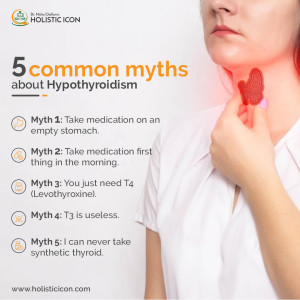
Monday Nov 16, 2020
Ten Myths About Hypothyroidism that may help you
Monday Nov 16, 2020
Monday Nov 16, 2020
People take thyroid medications and still have symptoms. Why? I explain the common myths in this very short podcast.
How you take your medications, when you take it and what tests determine how the medication should be adjusted is all discussed.
Remember it is only information not medical advice.
Watch the Youtube channel for the video here
Also, become more engaged in living a healthy lifestyle by making yourself more aware of it by following us on:
YouTube: Holistic ICON
Facebook: @NishaChellamMD
Instagram: @holisticicon
Twitter: @HolisticICON
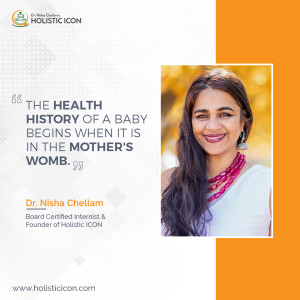
Sunday Nov 08, 2020
Before you become pregnant, ask your gut if it is ready
Sunday Nov 08, 2020
Sunday Nov 08, 2020
Like our skin is the barrier to the outside dirt, our gut is the barrier to the outside world. It protects us and any kind of medical issue at one level happens because that barrier has been damaged or violated. This is why the gut is the center of our overall health and wellness, and it's crucial to take care off your gut if you want to take care of the overall health of you and your family.
7 Powerful Ways to Help You Build a Healthy Child
Right from the beginning
- Resolve your gut issues before planning a baby
- Prefer vaginal delivery over C- section
- Prefer breastfeeding over other alternatives
- Don't introduce grains to your child's diet until 2 Yr. of age
- Keep yourself aware of nutrition from trusted sources
- Don't fall for marketing campaigns
- Avoid packaged or processed foods
If you want to learn more about how good gut health helps you build a healthy child? our latest Women Wired for Wellness podcast with Dr. Nisha Chellam, Internist and Founder of Holistic ICON and Dr. Malina Roberts, Naturopathic Doctor and Clinic Director at Advanced Naturopathic Medical Clinic.
Contact Dr. Roberts
https://advancednaturopathic.com/about-us/our-team/dr-melina-roberts-nd/
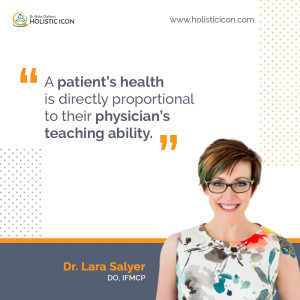
Sunday Oct 25, 2020
When Creativity helps Burnout in life and work
Sunday Oct 25, 2020
Sunday Oct 25, 2020
As a patient to be successful it is important to understand the human being who is helping you. Listen to this chat I had with Dr. Lara Salyer a family p0ractitioner from small town Monroe in Wisconsin explain what we can do to shift the system.
While most physicians want to work with their patients in a way that they teach, not tell their patients what needs to be done and why. However due to some evident blockages in the traditional medical system like insufficient patient and appointment time ratio, unreasonable performance metrics just to name a few, that more often that restrains them. This impacts their performance, causing burnout and frustration that bleeds into almost all other areas of their lives, cause doctors are humans too.
To prevent this from happening, it's very important for physicians and all healthcare professionals to keep that creative flow alive in their day to day work and practice which prevents burnouts and subsequently leads to re-energizing their careers, decrease in stress, and experiencing a prolific joy.
Our guest on this episode of Women Wired for Wellness podcast, Dr. Lara Salyer, OD, IFMCP, shares more on this and what steps can physicians take to make a positive shift in that direction.
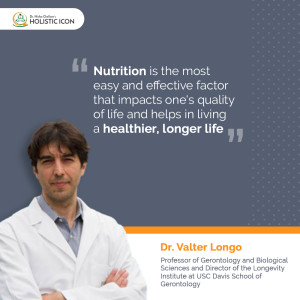
Sunday Sep 20, 2020
What is a longevity diet?
Sunday Sep 20, 2020
Sunday Sep 20, 2020
Top 5 Things to Know About Longevity Diet
Are you someone who fears to live longer because you think you won't live well? Then this blog is for you. In our latest podcast, Dr. Nisha Chellam, Internist and Founder of Holistic ICON along with Dr. Valter Longo, Professor of Gerontology and Biological Sciences and Director of the Longevity Institute at USC Davis School of Gerontology, address this issue that does living longer has to accompany ill-health and share how a longevity diet can help you live a healthier and longer life. This blog brings to you the top 5 things that you should know about a longevity diet.
Thursday Sep 10, 2020
Can Diabetes be resolved?
Thursday Sep 10, 2020
Thursday Sep 10, 2020
If you are a prediabetic or someone who has a family history of diabetics, thyroid, metabolic syndrome, or any chronic condition that you have seen occurring in your family line and you want to understand more about its symptoms, triggers, early detection, and prevention, then this blog is for you.
In this blog, you’ll get to understand:
- What is the difference between early detection and prevention and why does that matter?
- How does the traditional medical system function?
- What is it that the traditional medical system is not checking when it comes to disease prevention?
- What is the need for and availability of other options?
- What is the reason that triggers certain diseases to keep occurring in a family line?
- What are the two different types of diabetes, what is the difference between them and how do people acquire them?
- How to catch Type 2 Diabetes early?
- Does being thin exempts you from acquiring Type 2 Diabetes?
- One piece of advice for people who say I come from a family line of diabetics.
So without further adieu, let’s dive right in. Listen to this conversation with Dr. Shilpa Saxena to understand with great clarity the options you have to take charge and resolve type II diabetes.
